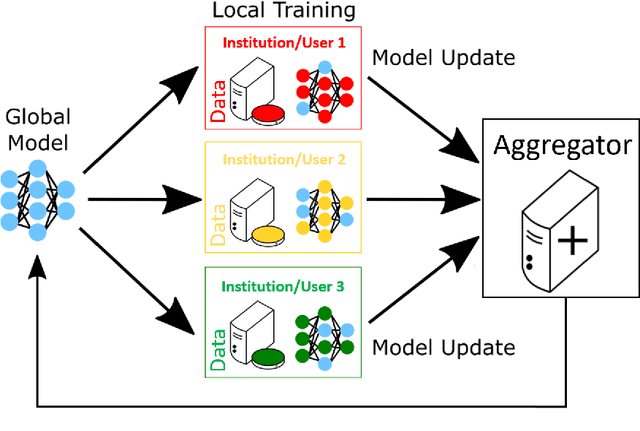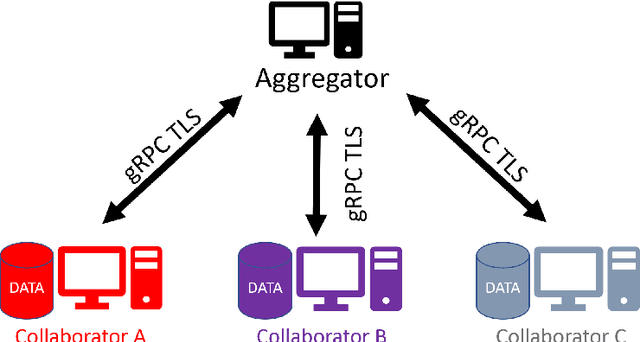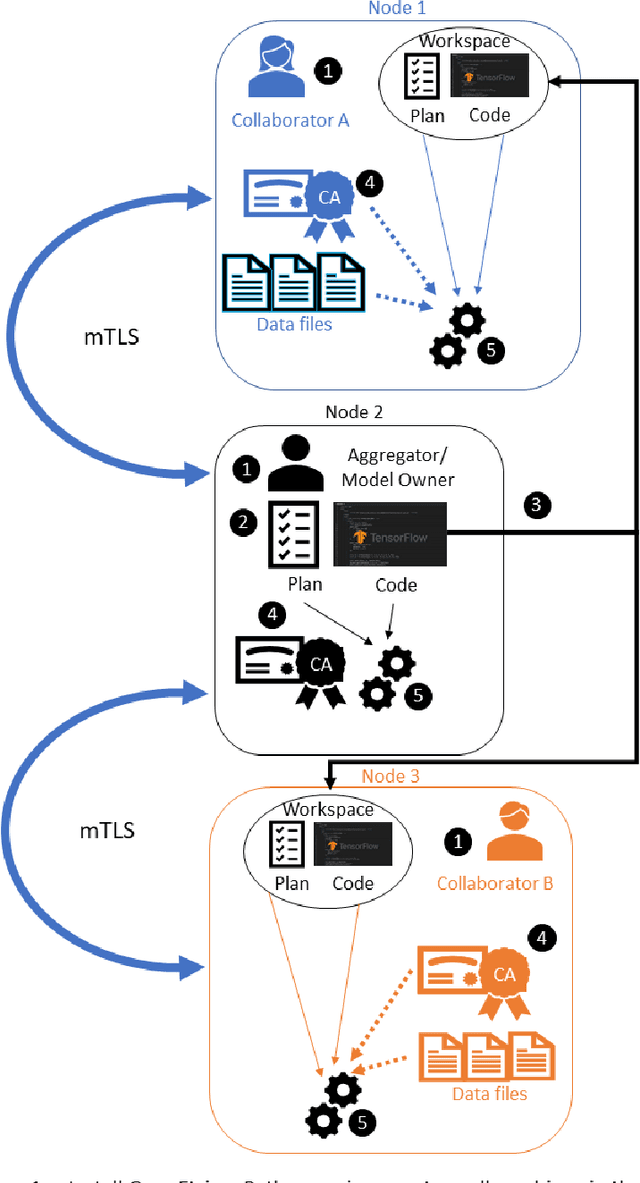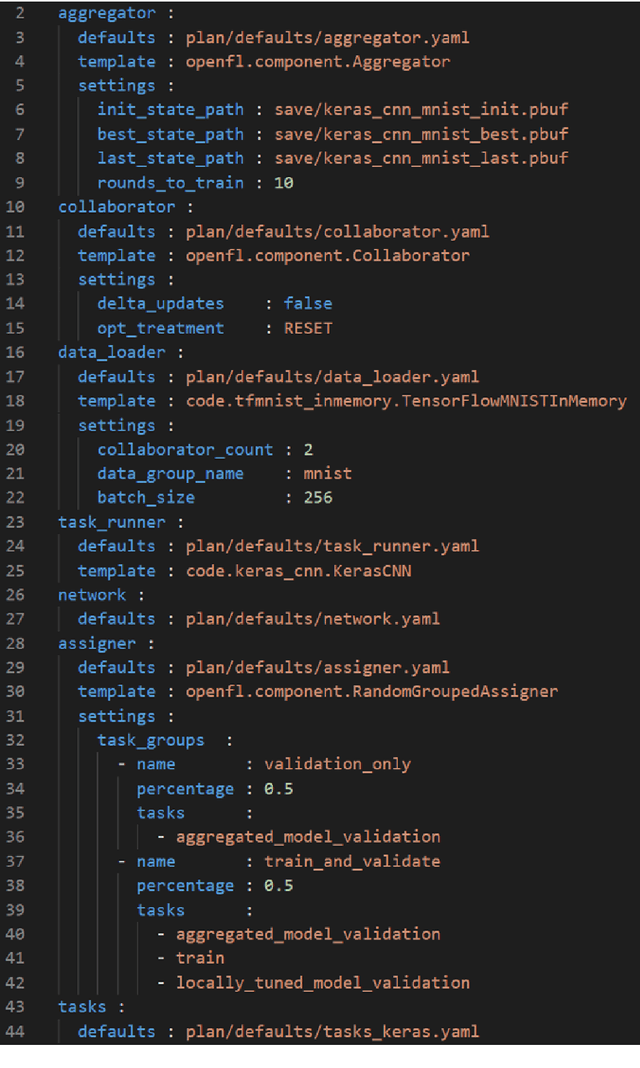Prashant Shah
Privacy-Enhancing Collaborative Information Sharing through Federated Learning -- A Case of the Insurance Industry
Feb 22, 2024



Abstract:The report demonstrates the benefits (in terms of improved claims loss modeling) of harnessing the value of Federated Learning (FL) to learn a single model across multiple insurance industry datasets without requiring the datasets themselves to be shared from one company to another. The application of FL addresses two of the most pressing concerns: limited data volume and data variety, which are caused by privacy concerns, the rarity of claim events, the lack of informative rating factors, etc.. During each round of FL, collaborators compute improvements on the model using their local private data, and these insights are combined to update a global model. Such aggregation of insights allows for an increase to the effectiveness in forecasting claims losses compared to models individually trained at each collaborator. Critically, this approach enables machine learning collaboration without the need for raw data to leave the compute infrastructure of each respective data owner. Additionally, the open-source framework, OpenFL, that is used in our experiments is designed so that it can be run using confidential computing as well as with additional algorithmic protections against leakage of information via the shared model updates. In such a way, FL is implemented as a privacy-enhancing collaborative learning technique that addresses the challenges posed by the sensitivity and privacy of data in traditional machine learning solutions. This paper's application of FL can also be expanded to other areas including fraud detection, catastrophe modeling, etc., that have a similar need to incorporate data privacy into machine learning collaborations. Our framework and empirical results provide a foundation for future collaborations among insurers, regulators, academic researchers, and InsurTech experts.
Federated Learning Enables Big Data for Rare Cancer Boundary Detection
Apr 25, 2022Abstract:Although machine learning (ML) has shown promise in numerous domains, there are concerns about generalizability to out-of-sample data. This is currently addressed by centrally sharing ample, and importantly diverse, data from multiple sites. However, such centralization is challenging to scale (or even not feasible) due to various limitations. Federated ML (FL) provides an alternative to train accurate and generalizable ML models, by only sharing numerical model updates. Here we present findings from the largest FL study to-date, involving data from 71 healthcare institutions across 6 continents, to generate an automatic tumor boundary detector for the rare disease of glioblastoma, utilizing the largest dataset of such patients ever used in the literature (25,256 MRI scans from 6,314 patients). We demonstrate a 33% improvement over a publicly trained model to delineate the surgically targetable tumor, and 23% improvement over the tumor's entire extent. We anticipate our study to: 1) enable more studies in healthcare informed by large and diverse data, ensuring meaningful results for rare diseases and underrepresented populations, 2) facilitate further quantitative analyses for glioblastoma via performance optimization of our consensus model for eventual public release, and 3) demonstrate the effectiveness of FL at such scale and task complexity as a paradigm shift for multi-site collaborations, alleviating the need for data sharing.
OpenFL: An open-source framework for Federated Learning
May 13, 2021



Abstract:Federated learning (FL) is a computational paradigm that enables organizations to collaborate on machine learning (ML) projects without sharing sensitive data, such as, patient records, financial data, or classified secrets. Open Federated Learning (OpenFL https://github.com/intel/openfl) is an open-source framework for training ML algorithms using the data-private collaborative learning paradigm of FL. OpenFL works with training pipelines built with both TensorFlow and PyTorch, and can be easily extended to other ML and deep learning frameworks. Here, we summarize the motivation and development characteristics of OpenFL, with the intention of facilitating its application to existing ML model training in a production environment. Finally, we describe the first use of the OpenFL framework to train consensus ML models in a consortium of international healthcare organizations, as well as how it facilitates the first computational competition on FL.
Addressing the Memory Bottleneck in AI Model Training
Mar 11, 2020


Abstract:Using medical imaging as case-study, we demonstrate how Intel-optimized TensorFlow on an x86-based server equipped with 2nd Generation Intel Xeon Scalable Processors with large system memory allows for the training of memory-intensive AI/deep-learning models in a scale-up server configuration. We believe our work represents the first training of a deep neural network having large memory footprint (~ 1 TB) on a single-node server. We recommend this configuration to scientists and researchers who wish to develop large, state-of-the-art AI models but are currently limited by memory.
 Add to Chrome
Add to Chrome Add to Firefox
Add to Firefox Add to Edge
Add to Edge